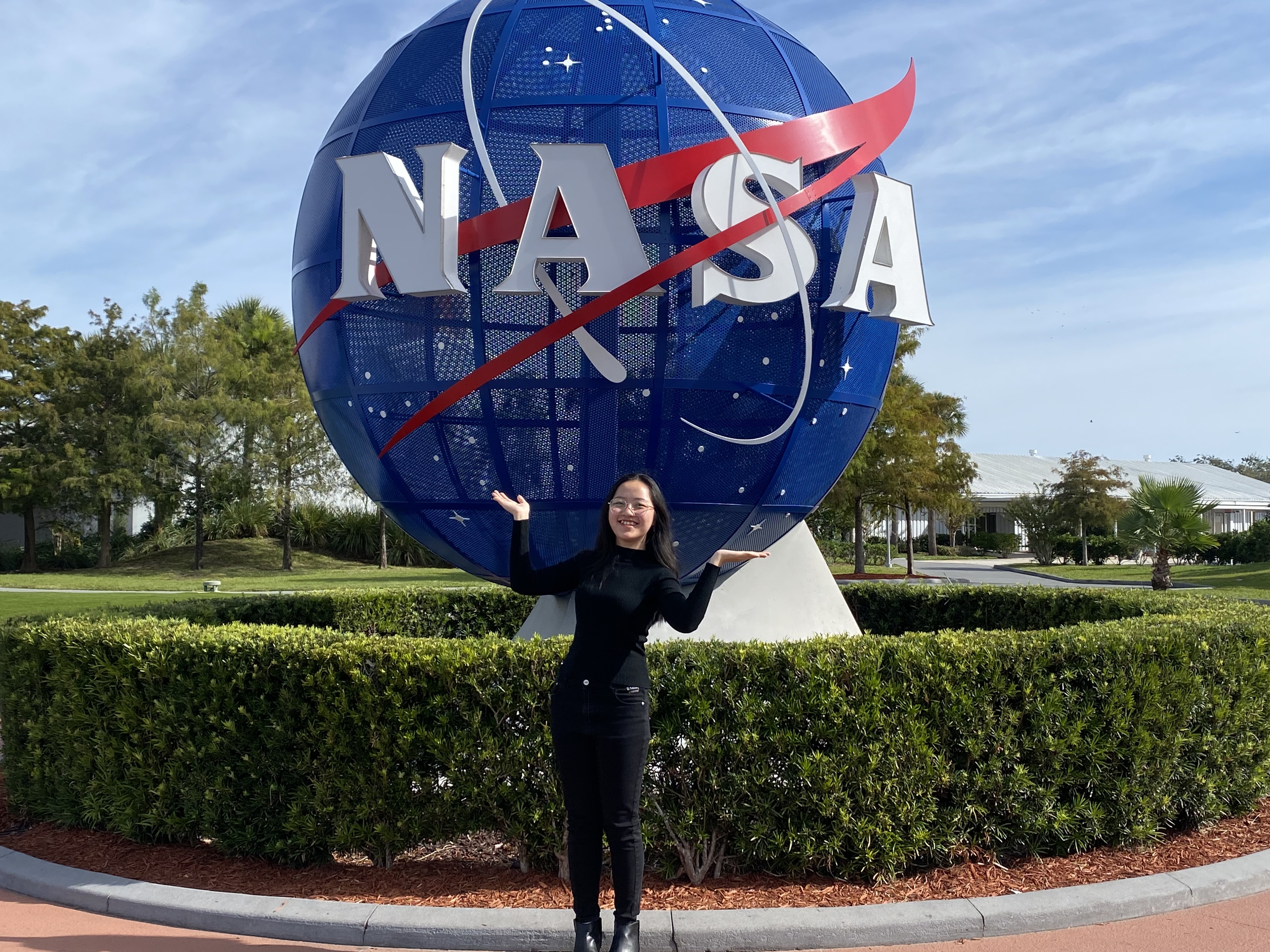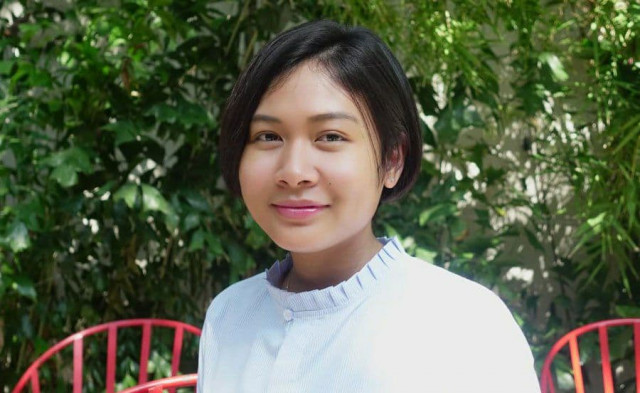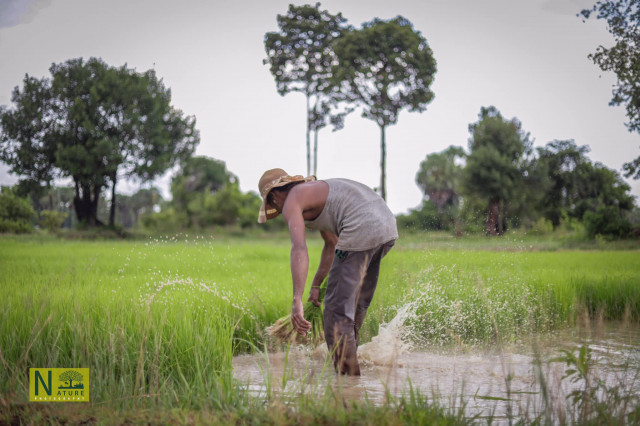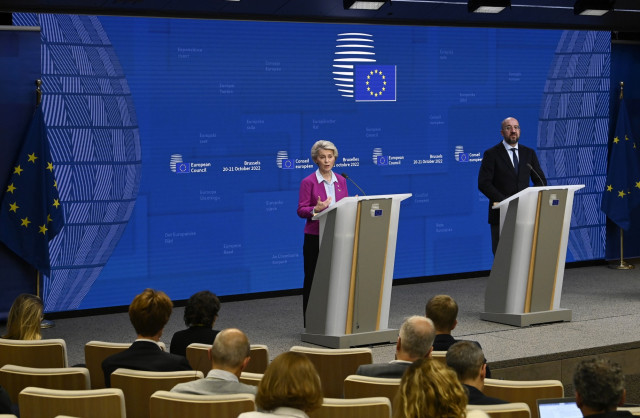Tips to Apply for the Global UGRAD Program
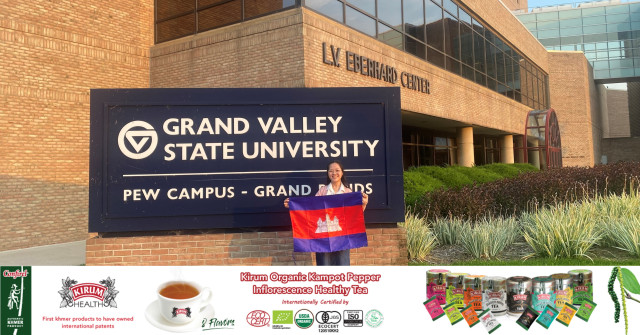
- By Rin Ousa
- November 4, 2023 12:00 PM
PHNOM PENH – Growing up in a lower-income family, Saing Muylin moved from Siem Reap province to pursue a bachelor’s degree in banking and finance at Paragon International University and a bachelor of arts in English translation and interpretation at the Royal University of Phnom Penh.
With her strong commitment and dedication, she has been awarded a one-semester scholarship at Grand Valley State University in Michigan in the US through the Global Undergraduate Exchange Program (Global UGRAD). Muylin shared her experience.
Rin Ousa: You have been studying banking and finance at Paragon International University for three years already. Do you think studying in the US is less or more challenging?
Saing Muylin: It’s very subjective based on each course. For finance-related courses, studying in the US is a bit more challenging, yet also very rewarding. It’s hard since I’m not familiar with some of the terms that are used; yet I feel like I have learned a lot about the US insurance market and financial market including stocks, bonds, and derivatives.
Although the lesson contents are hard, the professors are very sweet and supportive. I believe all of my classes follow a teacher-centered approach instead of the student-centered approach that we have been practicing at Paragon.
In my classes here, the teacher would provide lectures, then have us do in-class practice while they would walk around and help answer questions that we have. We are also encouraged to meet them during office hours to discuss any parts that we’re struggling with.
This helps me a lot with my academic struggles. Nevertheless, I do wish there would be more interaction between students and a more fruitful discussion in class.
Rin Ousa: As Cambodia and the United States of America have different cultures, have you experienced culture shocks? If yes, how did you overcome them?
Saing Muylin: Talking about culture shocks, there were a lot when I first arrived here.
First of all, people here are very friendly here and I like it. You could walk down the street and a stranger will compliment your outfit.
They will casually point out good things about you and praise you randomly. Everyone will hold the door, say “Hello! How are you?” And “Have a good day!” to people they never knew before. I notice that “Thank You” and “Sorry” are two other common phrases. People would apologize constantly for very small mistakes.
As someone who’s scared of small talk, I was very awkward at first. Nevertheless, there’s a phrase saying “When in Rome, Do as the Romans Do”, which shares a similar meaning to a Khmer proverb. Following that proverb, I’m adapting well. I’ve been observing and mirroring how people conduct themselves here. I was never good at small talk but now I can carry out conversations with strangers.
Another culture shock is that people are very serious about sports, especially American football. Even for a college football match, you can see a long line of cars queuing up for hours before the game. Every game consists of a matching band, cheerleading stunts, dancing and fireworks. You don’t see that in Cambodia unless it’s SEA Games. People are really mad when the rival team scores. There would be cursing and booing in the stadium.
Last but not least, the way classes are conducted is also very different. Students would come into the classroom with casual T-shirts, shorts, and hoodies while wearing caps during the lecture. Some would put their legs on the table during class. The professors don’t seem to mind at all. Regardless, in the professional setting, they would dress up accordingly.
Rin Ousa: What motivated you to apply for the Global Undergraduate Exchange Program (UGRAD)?
Saing Muylin: I would say going on an exchange program is the top item on my university bucket list. Let me break it down into two parts. The first part is why an exchange program? All my life, I’ve been dreaming about going abroad. My eagerness to see the world is the reason why I left my hometown three years ago to pursue my bachelor's degree in Phnom Penh.
I want to know more people from different cultural backgrounds, go to new places, and try new food, and what better way to do that than going on an exchange program abroad? I also want to know how finance is taught in another country so that I can polish my academic and professional development.
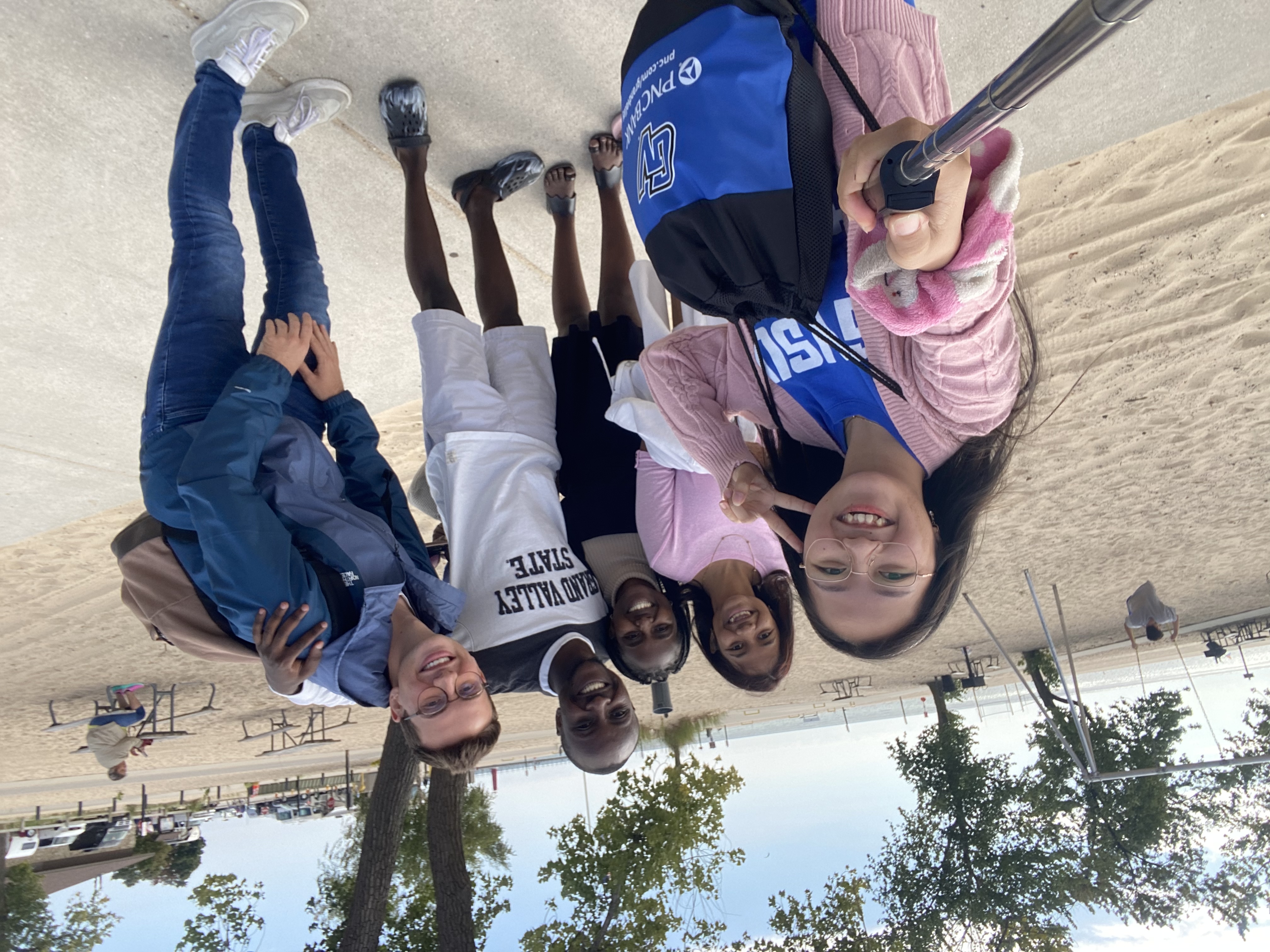
The second one is why Global UGRAD?
Coming from a lower-income family, I would not be able to afford to even go on an exchange program in our neighboring country. The Global UGRAD program is a fully-funded scholarship that allows students like me to break the financial barrier and experience life as an international student in America.
This program highly encourages cultural exchange which I’ve been wanting to do. I was so excited that I brought over four Khmer traditional outfits, accessories and many souvenirs. So far, I’ve met students from Nicaragua, Nepal, Georgia, Lebanon, Japan, India and Germany. They all have different stories to tell and taught me many things about their cultures.
Rin Ousa: It is true that there are many applicants applying for this incredible exchange program. What are your effective tips to make your application and interview outstanding among other candidates?
Saing Muylin: The first thing that I’ve known about this program is that it’s extremely competitive. Students from all universities are competing for around 5-10 spots. Since it’s not an internal university program, the number of applicants is high. Therefore, it’s very important to make yourself stand out.
The application stage is the hardest part because everyone may have the same answer to “Why would you be a great participant in the Global UGRAD Program?”. To answer this question, you must look at what the program values, is it high academic standing or strong leadership quality?
From my personal experience, the program is looking for those who possess strong leadership skills and are active citizens. You must prove that you are committed to serving your community by listing all relevant volunteering experiences and any project initiation you have. The more important part to include is the result of those experiences. What changes have you made to those around you or your community as a whole? It doesn’t have to be anything big. It can be as small as being a class monitor in high school and helping a classmate in need.
That’s what I put. I don’t have any grand experience in running a big project or creating something that benefits humanity. However, I have helped tutor my classmates, encouraging quiet students to speak and making my classmates feel inclusive. These small actions can have a huge impact on someone’s life. When writing the essay, don’t forget to keep it brief and link every point you make to a real-life example based on your experience. My piece of advice is “Don’t try to be someone you are not. Don’t make things up to fit what society deems as high achievers. You can be unique by just being yourself because everyone has been through different experiences in their life. And that’s what makes you special.
Being yourself is even more important in the interview. If you are shortlisted for an interview, that means your background is already more than eligible to be a successful candidate. The interview is when they want to know you as a person. Can you deal with cultural diversity? Which quality of yours that you are most proud of?
They want to assess your personality on whether you’ll be able to survive and thrive in a foreign country. The tip is to relax and practice a lot. There are many sample questions on the internet; therefore, you can practice by yourself or with a friend. A 15-minute interview is very short for all the questions that you will receive. Thus, keep your answer short, concise, and meaningful.
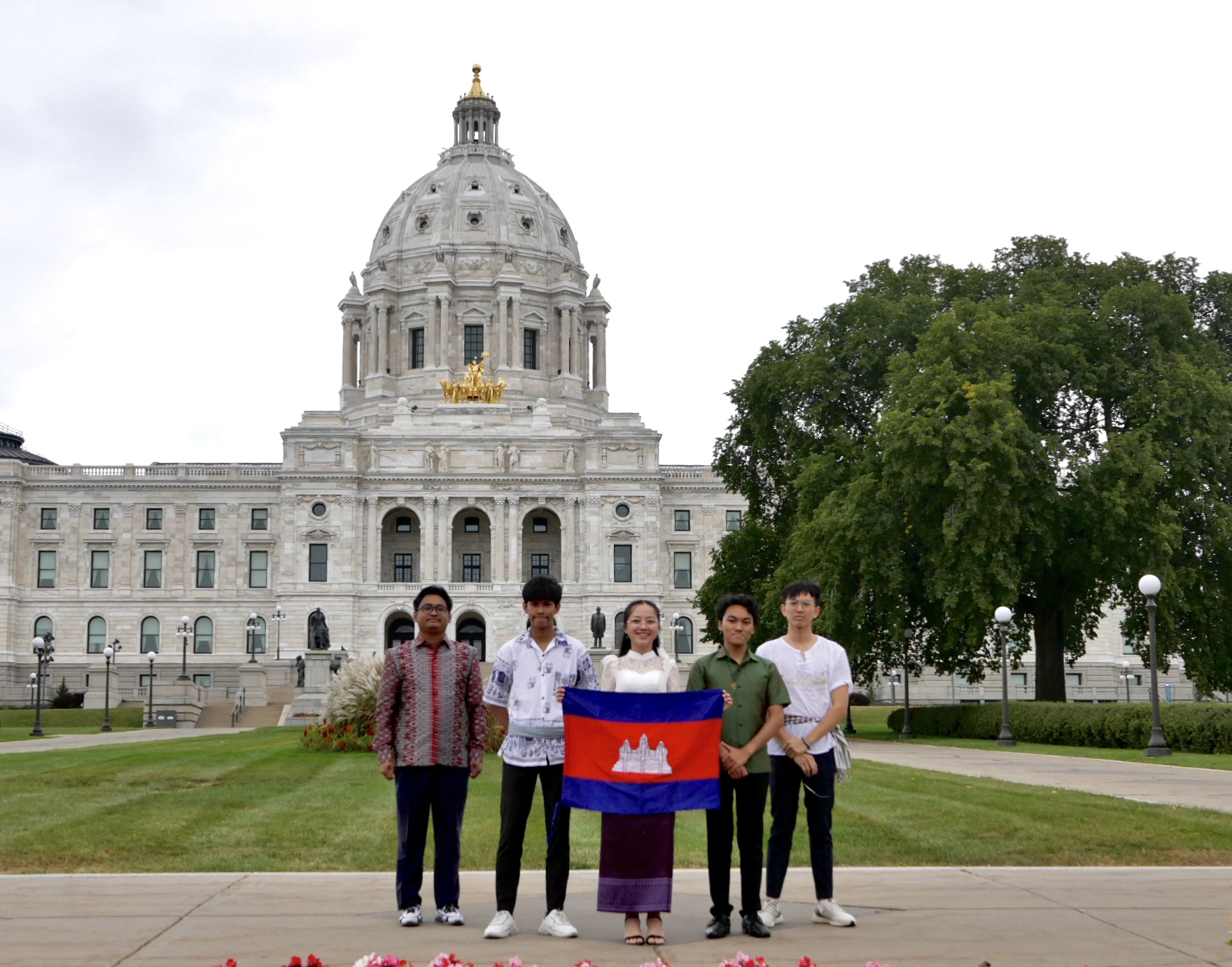
Rin Ousa: As stated in the application form, every successful applicant is also required to participate in 20 hours of community service, so do you find it challenging when it comes to time management? Could you also share some community services you have done until now?
Saing Muylin: Not at all, I have a lot of free time. It’s a lot less challenging compared to my time in Cambodia where I need to balance two universities with no less than 10 courses each semester, a part-time job, volunteering, clubs, and competitions. I feel like I’m on vacation here with only 4 classes to attend.
Last month, I volunteered at Kid’s Food Basket to package 2000 bags of healthy suppers for school children across West Michigan. I also participated in making bracelets for Children at the DeVos Children's Hospital. It was a fun and rewarding experience.
Rin Ousa: By immersing yourself in the new culture, what do you think are the magnificent things you have learnt in the US?
Saing Muylin: I have learned so many things. I admire how people are not afraid to voice their opinions here. Everyone can talk casually to their superior. This drives a more relaxing and interactive studying/working environment. There is less judgment and people don’t care what you are doing most of the time.
I accidentally blasted music in the library one time and no one turned around and laughed. I appreciate that because it would be very embarrassing if they did. The more practical skills that I have learned would be investment analysis and portfolio management. I have joined the Seidman College of Business Investment Portfolio Organization which is a student club at Grand Valley State University. The club has an actual $150,000 in assets that they invest in the stock market. I got a chance to meet highly admirable individuals. They have inspired me to pursue my future career in corporate finance and investment.
Rin Ousa: How does the Global Undergraduate Exchange Program shape your personal development and what changes have you noticed?
Saing Muylin: The opportunity to come to the US through the Global UGRAD Program really changed me as a person. Unlike other programs with a fixed schedule and full guidance like YSEALI, you are on your own with Global UGRAD. You are going to be an international student who doesn’t know a soul here. This made me thrive as a person. Global UGRAD boosted my problem-solving skills.
Experiences here taught me life skills like asking for a ride from strangers at 1am., trying to pack a week's worth of clothes into a small backpack for frontier flight, planning a trip across the country by myself, finding comfort food, networking, and experiencing American culture. I’m sure I’ll be more extroverted and brave when I go back to Cambodia.
Rin Ousa: Do you have any messages to Cambodian students who wish to take the plunge and apply for this exchange program?
Saing Muylin: If you are reading this article, that means you have taken your first step. I’m so proud of you. Eagerness to know, and to learn is the greatest asset you could have as a student. Go ahead and do a lot of research until you are familiar with the program. I can’t recall how many YouTube videos I watched last year. My search bar is full of “Tips to get selected for the Global UGRAD Program”.
My advice is to be patient, humble, and appreciative. The process of successfully applying for Global UGRAD can be as long as six months. Therefore, you must be patient and do your best in every stage. Do not lose motivation along the way. Be humble and appreciate what you were given. Global UGRAD has graciously provided us with a life-changing opportunity. Therefore, you should complete all the requirements and requests that they have such as completing community service and assignments. Remember that you are the representative of Cambodia; therefore, conduct yourself well when you interact with others.
Just do it. Don’t doubt yourself. I sound like a hypocrite saying this because I doubt myself on many occasions. But people may see you differently from how you see yourself. I live by the motto “Do it then fail rather than regret not doing it”. Only when you apply then you will know if the program is right for you or not. As a university student, you only have two years to apply, your sophomore and senior years. Why not try your luck both years?
